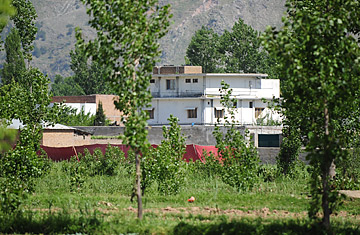
The hideout of Al-Qaeda leader Osama bin Laden is pictured after his death by U.S. Special Forces in a ground operation in Abbottabad on May 2, 2011.
Now I finally understand how Osama bin Laden eluded our grasp for all of these years — he was hiding in the open, in the backyard of one of our supposed allies. Let's put this in context: Pakistan is a police state where foreigners do not go unnoticed, even when they're living behind the high walls of a compound. On top of that, the compound where bin Laden was killed early Monday in a U.S. raid all but abutted the base of the Pakistani Army's 2nd Brigade. I can't help but suspect then that some Pakistani officials, at some level, were harboring bin Laden. And what about Pakistan itself? I don't have a clue, but I suspect the worst on that one too.
When bin Laden first disappeared off the U.S. radar in late 2001 at Tora Bora, a lot of people entertained every foolish conspiracy theory they could imagine, ranging from the suggestion that the al-Qaeda leader was in Riyadh as a guest of the Saudi royal family to the idea that he was at Area 51, protected by the CIA. During a prolonged visit to Islamabad three years ago I asked a local American correspondent who'd been in country for five years where she thought bin Laden was. She looked out the window at the house across the street: "Maybe there," she said. "Who knows about this country?"
The uninformed explanation I kept coming back to was that bin Laden had been killed at some point and buried, his followers not saying a word because they needed for him to remain a mystery — a beacon for the jihadist rank-and-file to follow. As for the digital audio recordings bin Laden made over the years, they're easily manipulated to make them sound current and convey the impression that bin Laden was alive. The explanation that he was living at the bottom of a cave in Pakistan's ungovernable tribal areas was certainly wearing thin.
Although I had left the CIA before 9/11, I can well imagine its internal conversations on bin Laden's whereabouts. Every time a junior analyst suggested the al-Qaeda was hiding in Pakistan proper — perhaps in a military cantonment area like the one in which he was killed — an old hand would have jumped in telling him that was too far-fetched to even discuss. "It's not in Pakistan's interest to hide bin Laden," the argument would run. "They get too much money from us. The generals who run the country are smarter than that. And anyhow where's the intelligence?" There were no intercepts of bin Laden calling from Pakistan proper; no defectors showing up putting him there.
Not surprisingly, of course, bin Laden after Tora Bora went off the digital grid. No emails, no cell phones, no Twitter. He apparently didn't even have TV in the compound he was living in, and even buried his trash. That may have explained the absence of hard intelligence, and the reason that his whereabouts were a blank slate — at least, apparently, until a courier was followed to the compound.
Catching bin Laden in Pakistan was a brilliant intelligence coup. And the Administration played it brilliantly as well, recovering bin Laden's corpse to prove the man's dead. But being someone who's never satisfied, I'd still like an explanation of why I'm wrong to suspect official Pakistani complicity. Or, if I'm right, to explain what's going on in that country and what, if anything, we intend to do about it.
Robert Baer, a former Middle East CIA field officer, is TIME.com's intelligence columnist and the author of See No Evil and The Devil We Know: Dealing with the New Iranian Superpower.
